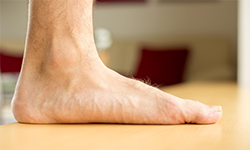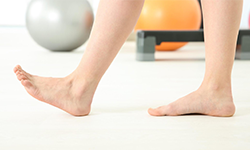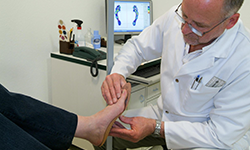Treat Flat Foot at MidAmerica’s Palos Hills & Mokena Locations

You’ve probably seen the post: different foot shapes can reveal your personality type? While we can’t prove this to be true from a medical standpoint, we can affirm that different foot structures can reveal why you are in pain.
Flat foot is one type of foot structure that often causes discomfort or pain, especially during rigorous exercise. In this blog, we’ll discuss what causes flat foot, when you should consult a physician and some potential treatment options available at MidAmerica’s Palos Hills and Mokena clinics.
What is flat foot?
The medical term for “flat foot” is pes planus and is diagnosed as a collapse in the medial longitudinal arch of the foot accompanied by sagging of the heel valgus. (News Medical) In other words, it’s when the arches of your feet fall flat when standing, which can cause physical pain during extensive physical activity.
For infants, this is a normal condition that usually disappears by the time they’re two to three years old, when their ligaments and tendons start to tighten. Unfortunately, 25 percent of American adults have flat feet. (Healthline).

An easy way to tell if you have flat foot is to take the “wet test”. Get your foot wet and step on a dry surface. Take five or six steps and then observe your prints. If the footprint is narrow, you have a normal arch. If the footprint is thick, you may have a flat arch or flat foot.
What causes flat foot?
There are several causes of flat feet, one being genetics. Another cause is if the ligaments and tendons in your feet never fully tighten when you reach 2-3 years of age. (Healthline). Additional causes may include:
- Weak arches
- A foot or ankle injury
- Arthritis or rheumatoid arthritis
- Damage to your posterior tibial tendon
- Cerebral palsy, muscular dystrophy or spina bifida
- Tarsal coalition
The condition may also develop during pregnancy or if the individual is obese or diabetic.
When do I consult a doctor about flat foot?
Many people with flat foot do not consult a doctor, because they are not in pain. However, if you are in pain or can answer “yes” to any of the below questions, it’s time to contact a physician at MidAmerica’s Palos Hills or Mokena locations. Questions your physician may ask include:
- Have your arches fallen flat recently?
- Do you have pain in your feet, ankles or lower limbs?
- Are you using supportive, well-fitted shoes or insoles and still experiencing pain?
- Are your feet becoming flatter?
- Do your feet feel rigid or stiff?
- Do your feet feel heavy or unwieldy?
Again, if you answered “yes” to any of the above questions, we advise contacting an expert who can help get you back on your feet in a healthy and productive way. (Medical News Today).

What can I expect from the visit?
Typically, a physician Palos Hills or Mokena clinic can diagnose flat foot by observing the way you walk or stand. They will examine your feet from the front and back and may ask you to stand on your tiptoe.
Expect to answer questions regarding your medical history and be prepared to take an X-ray, CT scan or MRI scan. (Medical News Today)
Are there treatment options?
Yes. Fortunately, depending on the severity of your condition and the particular cause, treatment options may include:
- Foot support: typically the first step in treatment, orthotics are shoe inserts that support your arch from falling flat. For children, this first step might be special shoes or heel cups.
- Lifestyle Changes: if your flat foot is a result of obesity or diabetes, your doctor may recommend exercise programs or dieting plans. They may also recommend staying off your feet if that’s what caused the condition.
- Medication: patients who experience sustained pain and inflammation are often prescribed nonsteroidal anti-inflammatory drugs (NSAIDs) such as ibuprofen, aspirin or naproxen to relieve symptoms.
- Foot Surgery: as a final result, foot surgery that creates an arch in your feet, repairs tendons, and/or fuses bones or joints would require a recommendation from an orthopaedic surgeon. (Healthline)
If I need surgery, what should I expect?
As mentioned, surgery is only recommended if orthotics or insoles fail. If you do need surgery, you can expect to receive a general anaesthetic to help with pain during and after the procedure. Also, expect to spend one night in the hospital. There are two types of surgeries that the physician may perform, most likely simultaneously:
- Tibialis posterior tendon reconstruction: Typically requires three incisions to remove the damaged tendon, which will then be replaced by another tendon. The new tendon is called the flexor digorum longus tendon or FDL.
- Calcaneal osteotomy: Involves a cut in the heel bone, after which the surgeon can reposition the bone and insert a metal screw to hold it in place. The specialist may also insert a metal plate at the top of the arch to improve support. (Fortius Clinic)
After surgery, plan to rest. You’ll have a cast up to your knee and may be prescribed painkillers. A rehabilitation program will be put in place and is important to stick to. Avoid putting any weight on the foot up until six to 12 weeks.

What can I expect long-term?
After initial treatment, it’s common to find relief wearing insoles, orthotics or alternative shoe support. If you’ve undergone surgery, the results are typically positive. Be sure to contact your doctor if you experience an infection, poor ankle movement or persistent pain after any treatment option.
For specialized care for flat foot, turn to MidAmerica’s Pediatric Orthopaedic Surgeon, Dr. Prasad Gourineni. Dr. Gourineni completed residencies in India and at Northwestern University in Chicago. He has worked in a number of Chicagoland Hospitals including Advocate Hope Children's Hospital in Oak Lawn, Children's Memorial Medical Center in Chicago, and Good Samaritan Hospital in Downers Grove.
To learn more about MidAmerica Palos Hills and Mokena clinics and the different treatment options available to you, visit our website. We also proudly serve Chicago, Oak Lawn, and Orland Park.
To schedule an appointment with MidAmerica’s Pediatric Orthopaedic Surgeon, Dr. Prasad Gourineni, call (708) 237-7200, or request an appointment online.

